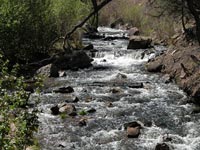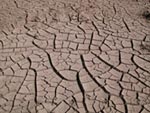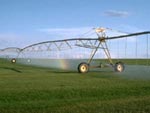- Reclamation
- Upper Colorado Basin
- Programs & Actvities
- Water Conservation Field Services Program
Water Conservation Field Services Program
Water is essential to all life, and every aspect of our lives depends in some way upon water. From all facets of food production, to domestic and industrial usage, to environmental needs, water is a critical common denominator. In the arid Western United States, this precious resource is especially valuable because it is so scarce. Most Western lands typically receive far less annual precipitation than that received by Eastern and Southern states. Early Western settlers quickly discovered that survival in this area was extremely difficult because rainfall was neither plentiful nor reliable. The transformation of this dry, barren desert region into productive farmland, and thriving towns and cities began with the construction of facilities to store and transport water.

Today, the many benefits of controlling water in this way are evident in the extensive development that has taken place throughout the West over the past 100 years. Huge cities have been created and millions of people live, work, and recreate in this desert region. But, as the West continues to grow, we must face the problem of continually increasing demands on a finite supply of water. This includes human population needs and the needs of the environment.
Unless highly efficient water usage practices can be developed and maintained in the West, it will not be possible to provide the water needed to sustain Western ecosystems as well as economic and population growth. So how will these increasing and diverse needs be met? By each one of us doing what we can to use water wisely. The responsibility to protect and conserve this vital resource to ensure that a sufficient water supply will continue to exist, rests with all of us.
Water Conservation Field Services Program
The Bureau of Reclamation was created by the Reclamation Act of 1902, to reclaim the arid Western United States. Reclamation accomplished this through the construction of water projects that allowed for settlement and economic development of the 17 Western states. Over the last century, Reclamation's responsibilities have evolved from constructing water projects and operating and maintaining facilities, into the broader aspects of contemporary water management issues and related resource management and protection.

Today, Reclamation's new mission as a manager, developer, and protector of water and related resources requires a new management approach to provide an adequate water supply for a growing population and a variety competing needs. More efficient use of water is a necessary element of the balance that must exist in order to supply water for residential, industrial, agricultural, environmental, recreational, and Native American needs while achieving flood control and drought management objectives.
In 1997, the Bureau of Reclamation initiated the Water Conservation Field Services Program to encourage water conservation and efficient use of water supplies on federal Reclamation projects, as well as foster improved water management on a watershed basis throughout the Western states.The WCFSP was designed to implement the Preferred Alternative in Reclamation's March 1996 Final Environmental Impact Statement on Implementation of the Reclamation Reform Act of 1982.

While the program emphasis under the RRA is to work with Reclamation projects, the WCFSP is also designed to contribute to watershed partnerships outside of Reclamation projects to promote more efficient use of water by all segments of the water-using community. Ultimately, efficient water use will benefit agriculture, urban communities, water-related recreation, and natural ecosystems.
There are four areas of emphasis under the Water Conservation Field Services Program.
- Water Management Planning
- Conservation Education
- Demonstration of Innovative Technologies
- Implementation of Conservation Measures
In this web site you will find information about activities and accomplishments within the Upper Colorado Region under each of these headings.
Water Management Planning
The Water Conservation Field Services Program was established to actively encourage water conservation, assist water districts with their responsibility to develop water conservation plans, and complement and support state and other conservation programs, particularly where improved water management can be fostered on a watershed basis.
Under the WCFSP, the term conservation is used to mean efficient use and not merely saving water for other purposes. The WCFSP is intended to assist both urban and agricultural water districts, manage water more effectively. The WCFSP focuses on measuring water to know how much is being diverted and delivered; accounting for deliveries of water to know where and how it is being used; and encouraging efficient water management practices to maximize the beneficial use of diversions from reservoirs, streams, and aquifers, while minimizing the environmental impacts to instream and other watershed resources.
The Water Management Planning component of the WCFSP provides assistance to water agencies in the development of quality water conservation plans. In many cases, this is technical assistance provided by Bureau of Reclamation staff. In other cases, it may be financial assistance through cost-sharing to support the district in the development of water conservation plans. Typically, Water Management Planning activities include:
- Conduct field visits to assist with resource inventories and water conservation plans
- Assist with planning surveys and designs, water budgets and investigations, studies, and evaluations
- Facilitate planning among districts by encouraging and developing partnerships and agreements
- Coordinate technical assistance through partnerships and agreements among organizations
Demonstration of Innovative Technologies
Through the Water Conservation Field Services Program local demonstration projects are supported such as improved water measurement, appropriate use of automation and telemetry control, new approaches to minimizing canal and ditch seepage, and innovative on-farm irrigation management methods. Some typical activities undertaken as part of the Demonstration of Innovative Technologies component of the WCFSP include:
- Assist with research, evaluation, and demonstration
- Sponsor specific conservation demonstration projects and activities
- Coordinate financial assistance for joint projects and partnerships with other agencies
Activities and Accomplishments
- Desert Rainwater Harvesting / Pueblo of Isleta
- Drip Irrigation Project / Socorro Soil and Water Conservation District
- Improved Water Measurement & Irrigation Practices / Weber Basin Conservancy District
- Irrigation Improvement Project / Shiprock Soil and Water Conservation District
- Multi-Irrigation Demonstration Farm
- Neighborhood Xeriscape Project / Neighborhood Housing Services of Provo
- Ute Mountain Ute Tribe Farm & Ranch Enterprise
- Water Information Program / Southwestern Water Conservation District
Implementation of Conservation Measures
The Bureau of Reclamation's Water Conservation Field Services Program provides both technical and financial assistance to water agencies to begin implementing conservation measures identified in their water conservation plans. This is one of the primary objectives of the program. Local programs provide cost sharing through cooperative agreements or grants, generally on a 50-50 basis. Some typical activities undertaken as part of the Implementation of Conservation Measures component of the WCFSP include:
- Assist water agencies with implementation of conservation plans and water management practices
- Provide funds for implementation through cost-sharing activities
- Facilitate partnerships with other organizations to conduct implementation activities
Activities and Accomplishments
- El Paso Water Reuse Project / El Paso Water Utilities
- Ramp Flume Installation - Florida Farmers Diversion Dam
- Real Time Canal Monitoring / Strawberry Highline Canal Company
- Replacement Diversion Structure / Silt Water Conservancy District
- Water Measuring Equipment / Middle Rio Grande Conservancy District
- Water Control Telemetry Stations / El Paso County Water Improvement District #1
Conservation Tips, Information, and Documents
- Achieving Efficient Water Management – A Guidebook for Preparing Agricultural Water Conservation Plans Link is to a PDF file September 2000
- Irrigation Scheduling Using Real Time Soil Moisture Measurements Link is to a PDF file
- Landowners Guide to Incorporating Irrigation Ditches and Laterals Link is to a PDF file – Colorado
- Landscape Irrigation Simplified Link is to a PDF file
- Water Conservation Field Services Program – 2000 Annual Report Link is to a PDF file
Upper Colorado Region Water Conservation Coordinators
Albuquerque Area Office
South West Texas
Woodrow Irving
El Paso Field Division
700 San Antonio St., Suite 710
El Paso, TX 79901-7020
(915) 534-6325
(915) 534-6299
wirving@usbr.gov
New Mexico
Joe Alderete
555 Broadway N.E., Suite 100
Albuquerque, NM 87102-2352
(505) 462-3578
(505) 462-3797
jalderete@usbr.gov
Provo Area Office
Jonathan Jones
302 East Lakeview Parkway
Provo, UT 84606-7317
(801) 379-1069
(801) 379-1195
jbjones@usbr.gov
Western Colorado Area Office
Grand Juncation
Vacant
445 West Gunnison Ave., Suite 221
Grand Junction, CO 81501
Durango
Ryan Christianson
835 East 2nd Avenue
Durango, CO 81301
(970) 385-6560
(970) 385-6590
rchristianson@usbr.gov
